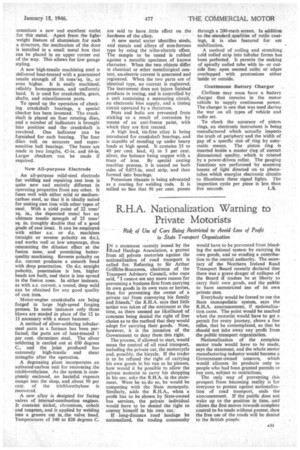REA. Nationalization Warning to • Private Motorists
Page 41

If you've noticed an error in this article please click here to report it so we can fix it.
Risk of Use of Cars Being Restricted to Avoid Loss of Profit to State Transport Organization I N a statement recently issued by the
Road Haulage Association, a protest from all private motorists against the nationalization of road transport is called for. Referring to Sir Arthur Griffiths-Boscawen, chairman of the Transport Advisory Council, who once said, "I cannot see any more reason for preventing a business firm from carrying its own goods in its own vans or lorries, than for preventing the owner of a private car from conveying his family and friends," the R.H.A. says that little notice was taken of the statement at the time, as there seemed no likelihood of concerns being denied the right of free choke as to the method that they would adopt for carrying their goods. Now, however, it is the intention of the Government to deny them this right.
The process, if allowed to start, would mean the control of all road transport, including the private car, the motorcycle and, possibly, the bicycle. If the trader is to be refused the right of carrying his own goods in his van as he pleases, how would it be possible to allow the private motorist to carry his shopping in his car, asks the R.H.A. in the statement. Were he to do so, he would be competing with the State monopoly. Similarly, adds the R.H.A., when a profit has to be shown by State-owned bus services, the private individual would have to be denied the right to convey himself in his own car.'
If • long-distance road haulage be nationalized, the trading community
would have to be prevented from bleeding the national system by carrying its own goods, and so evading a contribution to the central authority. The secretary of the Northern Ireland Road Transport Board recently declared that there was a grave danger of collapse of the Board if traders be at liberty to carry their own goods, and the public to have unrestricted use of its own private cars.
Everybody would be forced to use the State monopolistic system, says the R.H.A. announcement, if nationalization came. The point would be reached when the motorist would have to get a permit for every journey, above a few miles, that he contemplated, so that he should not take away any profit from the public transport organization.
Nationalization of the complete motor trade would have to be made, says the statement, and the whole motor manufacturing industry would become a Government-owned concern, which would allocate its products only to people who had been granted permits to run cars, subject to restrictions.
The only way of preventing this prospect from becoming reality is for everyone to protest against nationalization of road transport, ends the announcement. If the public does not wake up to the position in time, and allows the first moves towards complete control to be made without protest, then the free use of the roads will be denied to the British people.




























































